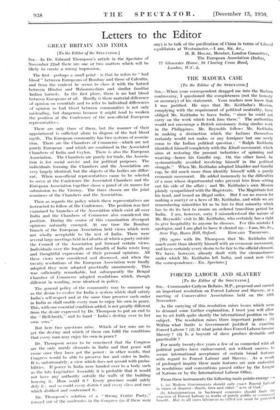Letters to the Editor
GREAT BRITAIN AND INDIA
[To The Editor of the SPECTATOR.] Sin—In Dr. Edward Thompson's article in the Spectator of November 22nd there arc one or two matters which will be likely to create a wrong impression.
The first—perhaps a small point --is that he refers to "bad blood" between Europeans of Bombay and those of Calcutta. and from the context he seems to class it with the hatred between Hindus and Malionunedans and similar familiar Indian hatreds. In the first place, there is no bad blood between Europeans at all. Hardly is there material difference of opinion on essentials and to refer to individual differences of opinion as bad blood between communities is not only misleading, but dangerous bemuse it might tend to weaken the position at the Conference of the non-official European representatives.
There arc only three of them, but the manner of their appointment is sufficient alone to dispose of the bad blood myth. The European community has two systems of associa- tion. There are the Chambers of Commerce—which arc not purely European—and which are combined in the Associated Chambers of India and Ceylon. There is also the European Association. The Chambers are purely for trade, the Associa- tion is for social service and for political purposes. The individuals forming the Chambers and the Association are very largely identical, but the objects of the bodies are differ- ent. When non-ollicial representatives came to be selected to serve at the Conference the Associated Chambers and the European Association together chose a panel of six names for submission to the Viceroy. The three chosen are the joint nominees of the Chambers and the Association.
Then as regards the policy which these representatives are instructed to follow at the Conference. The position was first examined by branches of the Association which exist all over India and the Chambers of Commerce also considered the position. During the course of this examination divergent opinions naturally emerged. At one time the Bombay branch of the European Association held views which were not wholly acceptable to the rest of India. There were several large meetings held in Calcutta at which a party outside the Council of the Association put forward certain views. Individuals over the length and breadth of India wrote long and thoughtful expressions of their personal opinions. All these views were considered and discussed, and when the twenty resolutions of the European Association were finally adopted they were adopted practically unanimously. This was sufficiently remarkable, but subsequently the Bengal Chamber of Commerce adopted resolutions which, though different in wording, were identical in policy.
The general policy of the "ty may be summed up as the desire to evolve for India a system which shall satisfy India's self-respect and at the same time preserve such order in India as shall enable every man to enjoy his own in peace. This, with one essential condition added, is not greatly different from the desire expressed by Dr. Thompson to put an end to the " Hell-broth," and to hand '' India's destiny over to her own sons."
But here two questions arise. Which of her sons are to get the destiny and which of them can fulfil the conditions that every man may enjoy his own in peace?
Dr. Thompson seems to be convinced that the Congress are the only unruly elements in India and that peace will ensue once they have got the power ; in other words, that -Congress would be able to preserve law and order in India. It is, unfortunately, a view which does not accord with proba- bilities. If power in India were handed over to a body such as the late Legiqative Assembly it is probable that it would not have any authority outside the walls of the building housing it. How could it ? Every province could safely defy it ; and so could every distrie t and every class and race which disliked and contemned it.
Dr. Thompson's solution of a " Strong Centre Party," formed out of the moderates in the Congress (as if there were any) is to talk of the pacification of China in terms of Liberal equilibrists at Westminster.—I am, Sir, &e.,
IL B. HOL3IE, Member, London Committee, The European Association (India), 77 Gloucester House, 19 Charing Cross Road, London, IV.C. 2.














































 Previous page
Previous page